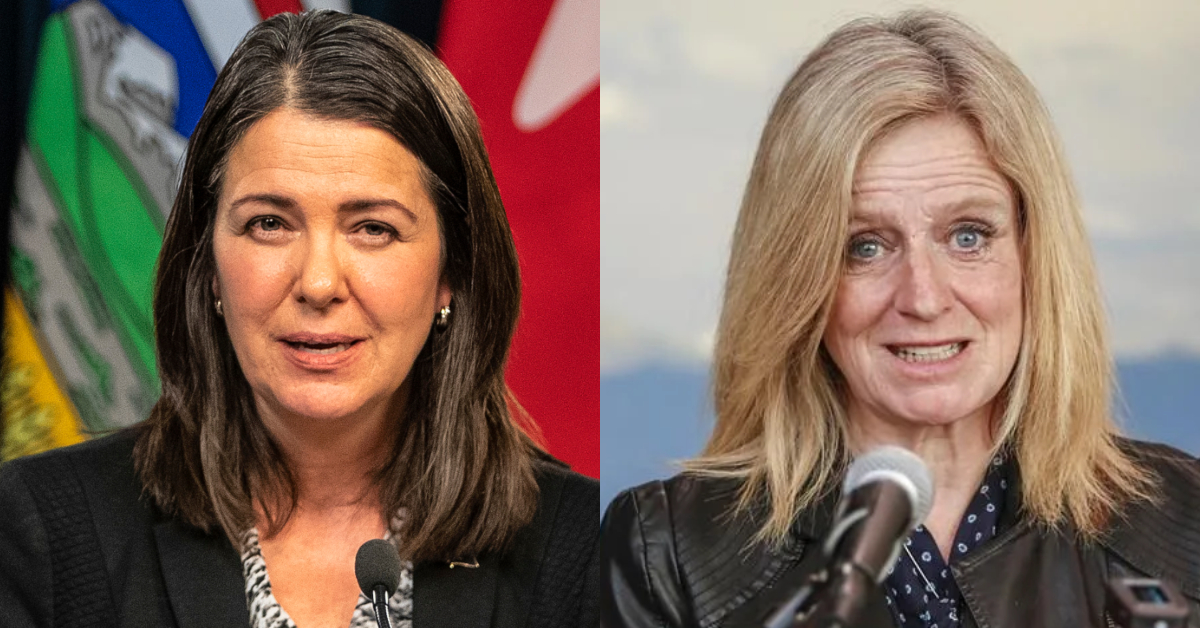A new poll suggests Alberta Premier Danielle Smith and her policies are not viewed favourably by the majority of Albertans.

The poll, conducted by Abacus Data from Dec. 6 to 10, says only a quarter of Albertans surveyed think the province is headed in the right direction. A slight majority, 54 per cent, said the province is off on the wrong track.
“Perhaps most importantly, more 2019 UCP voters think the province is off on the wrong track than think it’s headed in the right direction,” said David Coletto, CEO of Abacus Data.

Coletto called this group “reluctant UCP voters.”
Abacus asked Albertans about four of Smith’s core policies: the Sovereignty Within a United Canada Act, an Alberta police force, private delivery in Alberta’s healthcare system and stopping school boards from bringing in mask mandates.
Each of those ideas were unsupported by about 70 per cent of those surveyed.
Alberta NDP leader Rachel Notley is viewed more favourably than Smith, according to the poll.
While 43 per cent of Albertans surveyed view Notley positively, less than a third view Smith positively.
The survey also got Albertans to rate the leaders on a number of attributes, like intelligence, compassion, leadership and being in politics for the right reasons. Notley had a big lead in all categories except for “standing up for Albertans,” where she only had a two-point lead.

Get breaking National news
The poll gives the NDP a eight-point lead over the UCP in decided voter support.
However, a notable segment of voters are undecided — 25 per cent. That’s driven by those reluctant UCP voters who can’t quite stomach Smith, according to Mount Royal University political science professor Duane Bratt.
“They’re very unhappy with Smith, but they can’t quite get themselves to vote for the NDP. And I think that explains why the undecided is so big. So will they say: ‘As bad as Smith is, she’s better than Notley’?”
Bratt wondered if the reluctant UCP voters would go for a “safer pick” or just not vote at all.

A negative perception so early in the premiership spells trouble for Smith, as most new leaders start at a high point and drop over time, Bratt explained.
“Smith did not start at a high point. First impressions last. It’s going to be tough for her to change the impressions of her,” said Bratt.
The reluctant UCP voters are more concentrated in Calgary, the poll found. Coletto said they make up about 15 per cent of voters in the city.
“We’ve known for a while that Calgary will be the battleground. (Coletto) has clearly carved out that there’s a large segment of people who voted UCP in 2019 in Calgary that aren’t going to do that this time,” said Bratt.
The poll suggests issues that are top of mind for Albertans right now are cost of living, healthcare and the economy.
“The two things that Smith has put the most energy in since she became premier is about COVID and about the Sovereignty Act, and both of those are low salience issues for Albertans,” said Bratt.
The poll suggests Smith’s focus on fighting Ottawa may be alienating loyal conservatives in the province.
Across all voters, almost three quarters want the government to focus on the basics like healthcare, the economy, education and improving roads. Among current UCP supporters, views are split about fifty-fifty. Coletto said this divide underscores the challenges facing Smith.
“Her government’s initial focus on the Sovereignty Act and picking fights with Ottawa may find favour with a large part of her natural party base, but it may be off-putting to those she needs to convince to vote UCP again,” said Coletto.
Coletto said the group that will decide the next election are reluctant UCP voters.
“If the UCP and Danielle Smith think they will win simply by motivating their core base to vote with policy ideas that repel far more voters than they attract, Alberta may wake up the day after the election with another NDP government,” said Coletto.
The survey was conducted with 1,000 Alberta adults from Dec. 6 to 10. A random sample of panelists were invited to complete the survey. The margin of error for a comparable probability-based random sample of the same size is +/- 3.1 per cent, 19 times out of 20.








Comments
Want to discuss? Please read our Commenting Policy first.